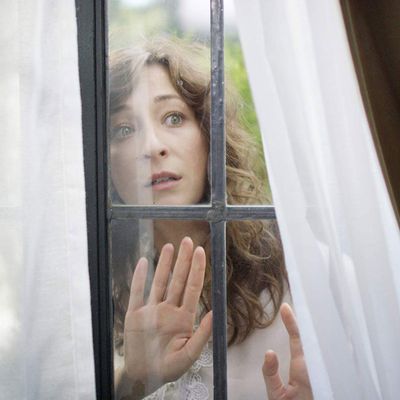
One of the strangest films I’ve seen this year, Clara’s Ghost is a twisted, slippery little whisper of a thing that refuses to let itself be easily defined. Directed by Bridey Elliott, and starring her and her own family playing variations on themselves — including her dad, veteran comedian Chris Elliott, and her sister, former SNL regular Abby Elliott — it strikes veins both horrific and comedic, without ever quite settling down to any genre.
Funnily enough, the real revelation here is Paula Niedert Elliott, the director’s mother, who does not appear to be a professional actor, but has the central role as Clara, the anxious wife of somewhat-has-been comedian Ted Reynolds (played by guess who). In the opening scenes, she and Ted drive to their local police station in Old Lyme, Connecticut, so she can report a shoe missing. As the befuddled young cop taking the report tries to understand why this strange woman wants the police to track down a stray clog, Clara’s insistence on the matter’s urgency is weirdly compelling: We ourselves become briefly convinced that this lost shoe from Marshalls is a matter of national urgency.
That’s one of the film’s more comic scenes, but like much of the rest of the movie, it comes with an undercurrent of dread. Is Clara losing her mind? Has she always been this eccentric? And why is Ted just sitting outside in the car, dreaming of his next cocktail, while his wife makes a fool of herself to the cops?
But self-absorption rules this family, as we soon learn. Ted and Clara’s actress daughters Riley and Julie (played by Bridey and Abby Elliott, respectively) are coming home for the weekend, and during their Metro-North train ride, we sense the sisterly tension caused by the fact that one is a lot more famous than the other. On the train over, Riley asks Julie if she’d join her for a live Brooklyn gig that she really needs; Julie refuses, claiming it’s beneath them. Julie asks Riley not to Instagram the train selfie they just took; Riley refuses, saying testily, “Just giving people what they want.”
Back home, the competitiveness becomes even more poisonous. Ted has just been fired from a movie by Julie’s fiancé, and his interaction with the girls seems colored by a nutty mixture of parental support and professional pissiness: He’s determined to cut Julie down to size, though he seems to couch his actions in the guise of fatherly advice. Watching these people snipe and snip at one another is funny, but eventually, you may start to be weirded out by their pathological narcissism.
Over the course of their booze- and weed-fueled evening, the family’s behavior gets stranger and stranger, along with the film’s style, as Elliott cuts in and out of scenes at odd points, and deploys a couple of truly bizarre montages that seem to veer between comedy, lyricism, and creepiness. Meanwhile, Clara’s hold on reality seems to grow ever more tenuous. She starts speaking to the ghost of a young girl, an allegedly mentally ill young woman who lived in their house more than a century ago. But the apparition only shows up sporadically, and doesn’t initially seem to have much bearing on the plot — leaving us to wonder whether this is more a symbolic specter than a real one. Clara’s Ghost, in other words, isn’t really a ghost story, which makes you wonder what Clara’s real ghost is.
For all the complicated unease it provokes, this really is a simple, unassuming movie. The cast is basically just the Elliotts, plus Haley Joel Osment (in a winning turn as the local pot dealer/handyman). The setting is their house and surrounding environs. The shots aren’t complex, the scenes aren’t elaborate; it’s the way they’re performed and juxtaposed that start to evoke something more profound. The director reportedly based much of the film on her own family’s oddball rituals and in-jokes, and the power dynamics between the characters play like self-aware riffs on what we might imagine the real-life Elliotts’ potential insecurities to be. I found myself wondering at various points if Chris Elliott really is this big a jerk in real life, and if Abby Elliott really is this full of herself. (One assumes not, since they agreed to be in this movie.)
But their behavior also works as an effective background against which to play Clara’s gathering psychic unease — the others are so wrapped up in their flamboyantly neurotic one-upmanship that they completely ignore the fact that mom is in the kitchen, talking to ghosts and cutting and recutting watermelon all night. And it also makes you wonder if she might simply be the receptacle for all of their negative energy — the one who has to absorb the ill will these professional performers barely keep hidden. Clara’s Ghost doesn’t answer any of these questions, leaving us in a state of edgy, itchy discomfort. For such a tiny, modest film, that’s quite an accomplishment.


